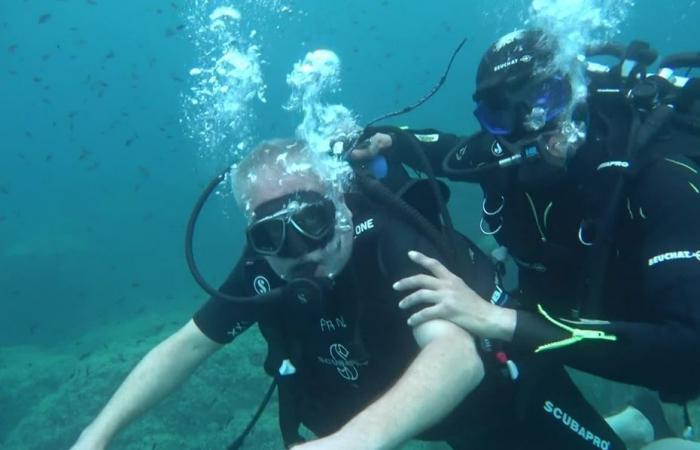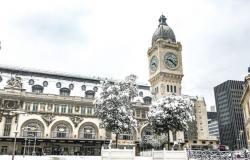
Written by Loic Blache
share this article:
Eight years after the Nice attack, the trauma is still very present among the survivors. To try to alleviate post-traumatic stress, some are testing a new therapy: scuba diving.
The essentials of the day: our exclusive selection
Every day, our editorial team reserves the best regional news for you. A selection just for you, to stay in touch with your regions.
France Télévisions uses your email address to send you the newsletter “The essentials of the day: our exclusive selection”. You can unsubscribe at any time via the link at the bottom of this newsletter. Our privacy policy
Diving to heal invisible wounds… Sophie, Valéry and Patrick are forever linked by what they experienced and saw on the evening of July 14, 2016, during the attack on the Promenade des Anglais in Nice, where 86 people were mowed down by a terrorist's truck.
These three survivors suffer from post-traumatic stress. That day, they set sail at sea and go diving together for the first time. “For me, it's complicated, but I'm here!“, Valéry Luczynski convinces himself.
Against trauma, diving has valuable virtues, studied for years by several doctors. Reduction in stress or heart rate, other victims of attacks have already tested this extraordinary therapy.
“You have to be aware of your ventilation“, explains Sylvain Hudry, the diving instructor. The latter is used to managing these particularly sensitive profiles. “We will spend a lot more time on the surface preparing them for the immersion phase, so that they get used to breathing with the equipment, to feeling things.“
The small group then embarks for a 15-minute crossing to the bay of Villefranche-sur-Mer (Alpes-Maritimes). On the boat, tension rises. Especially for Valéry Luczynski. Since the 2016 attack, the sea has been his nightmare. “For eight years: no swimming pool, no sea! While I am a swimmer…“
During the attack, people jumped into the sea from a very high height, 2-3 meters, they broke their legs… In the water, they were screaming, and that stayed with me. It's like a cancer, it takes you slowly and it can almost lead to suicide.
Valéry Luczynski, survivor of the Nice attackat France 3
This cancer also affected Sophie Desvergnes. On the night of the horror, the double bassist saw everything from the stage where she was performing. Carelessness and partying have given way to devouring stress.
For years, playing became an ordeal for Sophie Desvergnes, to the point of transferring her discomfort onto her double bass. “I hate her, I don't want to see her anymore, she has to go!“, says the musician.
Once you've experienced that, been in the middle of such a war scene, you say to yourself that it could happen anywhere, at any time, to anyone. That's what's complicated. We would like to return to what we were before.
Sophie Desvergnes, survivor of the Nice attackat France 3
Of the three friends, Patrick Prigent is the only one who can return to the Promenade des Anglais. Since the attack, the municipal police officer has been supporting the survivors within the Life for Nice association. It was by turning towards others that he found meaning in his life.
“When the truck leaves the sidewalk, it is 1m50 from me“, remembers Patrick Prigent. “All the people who were there are no longer there. We feel guilty, we wonder why we didn't stay there too?“
One morning in the hospital, I talked to myself. I yelled at myself: 'why are you looking down? Why don't you raise your head?'
Patrick Prigent, president of the Life for Nice associationat France 3
In his reconstruction, Patrick chose to accompany Sophie in this dive.
On the boat, like a new ordeal, a storm breaks out just when we have to jump into the water. Valéry Luczynski, courageous, goes first.
A magical sensation, which cannot only be explained by the beauty of the seabed. After a few minutes, breathing becomes deeper and calmer.
According to a study carried out in Nice in recent months, breathing underwater activates areas of well-being.
After his dive, the man appears transformed.
It was wonderful! Lots of emotions and very happy to have done it. I am PROUD OF MYSELF!
Valéry Luczynski, survivor of the Nice attackat France 3
From the boat, Patrick Prigent watches over Sophie Desvergnes' diving. “I said to myself: 'relax, let yourself be guided'… And it went well!“, she says. “Absolute calm, it was so good!“Sophie Desvergnes has a smile on her face.
On board, during the return, the atmosphere completely changed. And Valéry Luczynski is even making plans: “get back into swimming“.
I'm going to dive back in, I'm going to succeed and I'm going to turn the page!
Valéry Luczynski, survivor of the Nice attackat France 3
A process that will still be long, but all three are convinced: diving can help them.
(With Carla Génévrier, in Villefranche-sur-Mer)





